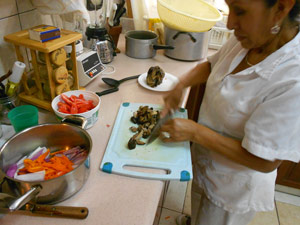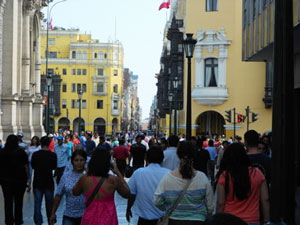
Morning: In the mornings I enjoyed waking earlier than the other 8-9 volunteers and sitting in the large combination dining and living space while reading up on Peruvian culture. Often times the house staff would open the sliding glass doors to the backyard, allowing bird chirping and a cool breeze to refresh the air inside. Breakfast is the lightest meal of the day for Peruvians so for us it consisted of hard boiled eggs, coffee, bread, slices of cheese, jelly and a glass of either papaya or mango juice. By 7 o’clock or so everyone was gathered at the table including the house staff and shortly thereafter we were piled into the CCS shuttle-van off to our volunteer assignments.
Two other volunteers and I were given the task of supporting the kitchen at the Martincitos elderly recreational center in Villa El Salvador. Between preparing meals and games of Bingo we talked and crafted necklaces and solved crossword puzzles. The two days of the week that the soup kitchen was closed, we accompanied the Martincitos staff to home visits to those who were unable to attend the center (either from illness or lack of access) to encourage attendance and to provide social and emotional support.
Afternoon: Afternoons were copious amounts of delicious steaming foods followed by beached volunteers in bunks, on the couch or in the backyard, quietly reading, writing or puzzle building. Still somewhat hazy from lunch were off to an activity ranging from a tour of downtown Lima, language lessons or museum walk-throughs or some nights we went our separate ways to either the beach in Miraflores or to San Isidro for drinks or Karaoke just blocks from the house.
Highlights: Traveling is often a solitary experience and more so in my case, as I have never traveled extensively with anyone for more than a few days. For me this was a very different set of circumstances as I have no concept of what’s socially acceptable behavior when it comes to traveling with other people. Are these volunteers going to be bothered by my aimless wandering and my tendency to get lost and ask strangers for directions or my inability to sleep past 6am? Add to that the elements of being in a foreign country with very limited understanding of the host language and a huge sprawling metropolis of 9 million people (I’m from a town of 5,000). But as it turned out they were as curious as I was and better seasoned. They had an incredible sense of humor and from that I have some of my favorite memories at our own expense.

Like many other travelers I have a list, goals for when I go somewhere; I want to see this…try that… One of which was to walk through the markets in Villa El Salvador and if it had not been for the amiable short cook, Alberto, (who for the life of him couldn’t understand why, in my home town, we stop our cars for turtles crossing the road and not take them home and eat them) I would not have seen pillowy white sheets of cow stomachs hung for sale, dozens of varieties of corn, fish and elbow to elbow people lugging goods from one makeshift vender-stall to another.
But that was the cultural experience I wanted to have, the emotional was more intense and caught me off guard. The setting of Villa El Salvador is a visceral one; a disheveled desert district congested with three wheeled taxis, people and stray dogs, reconstructing itself from war and corruption, literally, with large stacks of bricks outside the doors of peoples open roof shacks and garbage collectors cleaning up the trash, piled like snow banks on the side of the road, sometimes lit and left to burn. The people we visited had ailments such as an advanced stage of cancer, to a wound from a piece of debris in the street and a case of alcoholism. Some people simply couldn’t leave their home unattended, as its custom to have at least one person at the house at all times to keep away thieves. This usually means the person who is unable to work: a grandparent. One of which was a woman who had actually been present at the time of the founding of the district, in the 1970s and witnessed the struggle of the land grab by the peasants.
As the end of the week came and my time in Lima was closing, I booked, through CCS, an excursion to a remote village called Caral, about 3 hours north of Lima, in the Supe River Valley. Here, is the oldest civilization in the Americas. So I spent my last hours in Peru walking between the temples, with my own guide, in an isolated desert valley of farmers and goat herders on the edge of the Andes and eating corn on the cob with kernels the size of grapes.
CCS very much provided access to the places and experiences that were most important to me. The house staff was supportive and helpful and even willing to let me cook in their kitchen. The accommodations made by the site director for my trip to Caral was an unexpected surprise and added another dimension to an already amazing trip. The Insight abroad program proved to have a great balance of personable experiences with positive cultural immersion so much that I have decided to return in October of 2012 for a second week of volunteering and to hike the Inca Trail to Machu Picchu.